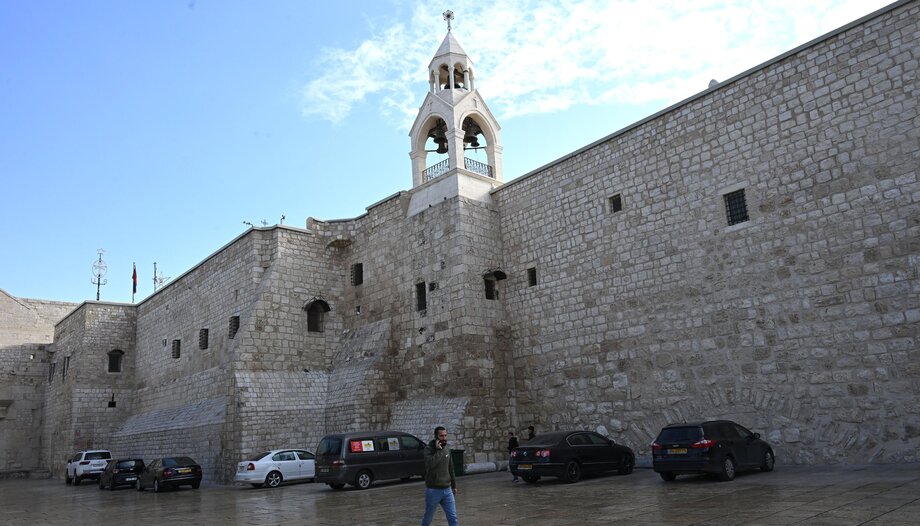I spoke to Rony Tabash on the phone the other day and my heart broke. I could hear him bustling at the counter of his store, and in the background I could hear the call to prayer from the nearby mosque. That unmistakable chant immediately transported me there, to Bethlehem, to the centrally located Manger Square, where the bells of the iconic Church of the Nativity, whose walls have stood since the time of Justinian, also ring out.
However, my nostalgic memories came face to face with reality: "Belen is dying," Rony told me. "It doesn't feel like Christmas here. There are no decorations, no lights or anything. Entering the Church of the Nativity is scary; it's empty."
To hear this from Rony, one of the most stubbornly optimistic people I've met in my life, is to hear this from Holy Land, is really bleak. "Last year, we had hope that the war would end before Christmas, but this year... People don't expect a good life or good news, they have lost hope."
The shadow of the conflict in Gaza is long. In addition to the direct casualties - some 45,000 dead, tens of thousands wounded and more than a million displaced - the war has put the lives and businesses of many people beyond the Strip, in the Palestinian territories of the West Bank, in jeopardy. This is the case of the small city of Bethlehemwhose economy revolves around Christian religious tourism: hotels, restaurants, souvenir and handicraft stores, guides, transportation...
The Tabash family has held, since 1927, The Nativity Storeone of the first gift stores in Bethlehem. They sell jewelry and all kinds of religious articles. It was created at the time of the British Mandate of Palestine, has survived the wars of '48 and '67 and has witnessed the intifadas. In recent years, the closures imposed by the coronavirus pandemic for two years, were a hard blow to the entire tourism sector in the city. Holy LandThe number of pilgrims was at an all-time high. The lines to kneel for just a few seconds at the place where Jesus was born were up to two or three hours long and stretched out of the basilica to the middle of the square.
Just as tourism was beginning to pick up and recover pre-pandemic figures, the outbreak of the war in Gaza clouded the horizon once again. Fourteen months later, there is no light, not even the light of the star of the emblematic Christmas tree that was placed every year in the Manger Square. Neither last year nor this year has there been a tree. The terrible war in the Strip and the harsh conditions in which they find themselves cast a shadow over a holiday that until recently brought together pilgrims from all over the world.
"We opened because my father wants to open the store, but we have no sales. It's a miracle we're hanging on." Indeed, many are not holding on. About 70 families from Bethlehem's Christian minority have left this year, perpetuating a bloodletting that has lasted more than a hundred years and decimated the Holy Land's Christian population. "My experience is that those who leave don't come back," says Rony.
However, what really shook me in my conversation with him was not grief for the Christians of Belenbut our indifference. An indifference fruit of ignorance, of blindness. Because Bethlehem is not a mythical place, it is real. HIC (here), is the word that is read in many of the holy places together with the corresponding Gospel verse. Our faith has a geography, a precise location, and there are those who, for generations for more than two thousand years, guard those places and perpetuate the Christian presence. "We are soldiers who are here to resist, we are the 'living stones'," Rony was telling me with the strength of one who firmly believes in his mission. "But the Christians have to come, it is also their responsibility," there was a hint of frustration, of weariness in his voice. "They can't leave us alone."
We have left them alone. There where the star shone, there where the angels sang, there where Hope was born, they see only darkness. And they are leaving. They are leaving Jerusalem, Nazareth and Bethlehem, those places so dear to us that, I insist, are not locations of stories or legends, they are the Here that Jesus Christ wanted to dwell on earth. "You have to come, to touch, to be part of this place." We are part of those places and those places are part of us, and we owe that in part to people with first and last names. Rony Tabash is just one of them.
"Christmas is the light in the darkness," he told me, "but we need prayers, because we have lost hope." If Christmas dies in Bethlehem, something will have died in each of us, but that can only be understood by those who have been there and touched. This is the Holy Land. Those who have tasted it know it.








